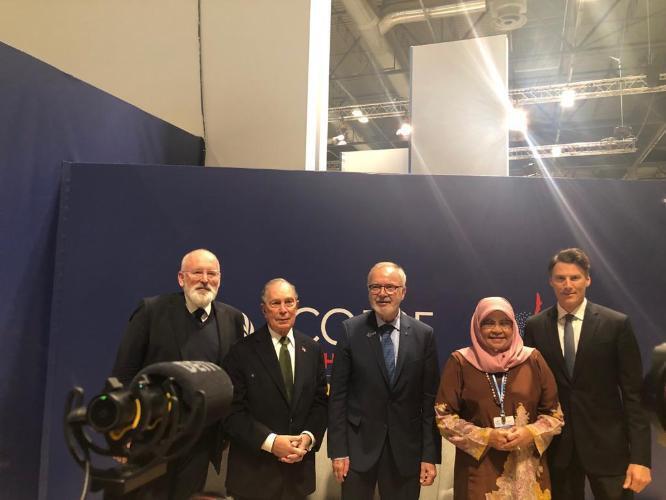
$ 5 m “PropteX” Program aims to support startups, innovation
Paragon Developments has teamed up with Adeer International, PMaestro alongside their German partner, QNTF, to ...

The European Investment Bank selected Tunisia’s Monastir city among five frontrunner cities that pursue ambitious and potentially transformative urban climate projects.
The five cities; namely Cotonou (Benin), Makindye (Uganda), Monastir (Tunisia), Jambi (Indonesia) and Recife (Brazil), now qualify for the next phase of the Global Climate City Challenge (GCCC), a partnership between the Global Covenant of Mayors and the European Investment Bank endorsed by the European Commission. They serve as role models for climate action in key sectors and cities in the Global South.
The five cities could receive technical support from the European Investment Bank (EIB) to get their projects off the ground. The projects focus on critical urban climate action including improving waste management, cutting river and ocean pollution, sustainable urban transport, greening urban spaces and enhancing urban resilience to the effects of climate change.
The Global Climate City Challenge was launched in September 2018. From an initial 140 projects and 100 applicant cities these five have emerged as the frontrunners. Urban finance and climate experts are now working with municipalities and their partners in order to scope out the details of their project needs. If successful, the projects will generate important social and environmental co-benefits.
“The Commission is making the European Green Deal its number one priority,” said Frans Timmermans, newly appointed Co-Chair of GCoM and European Commission Executive Vice President for the European Green Deal. “The European Commission is proud to endorse this step forward in accelerating local climate action, not only in Europe but across the world.”
EIB President Werner Hoyer said, “Cities need support in getting their climate projects off the ground and, as we strengthen our role as the EU’s climate bank, we at the EIB need great role models. In that respect The Global Climate City Challenge, our partnership with GCOM, is immensely important: it showcases climate leaders like the 5 announced today but also helps identify what is really needed locally to make them bankable, improve the lives of local people, and tackle climate change.”
Former New York City Mayor and Co–Chair and Co-Founder of GCoM Michael R. Bloombergsaid: “There are more than 10,000 cities in the Global Covenant of Mayors, and together they are home to a huge number of promising ideas. The Global Climate City Challenge will help turn the best ideas into real policies that improve people’s lives – and spread from city to city.”
“The recognition of Recife by the EIB and GCoM, among hundreds of projects from all over the world, comes at a very special moment after hosting the Brazilian Climate Conference and officially declaring the global climate emergency,” Geraldo Júlio, Mayor of Recife, Brazil and president of ICLEI South America’s Regional Executive Committee said. “We are motivated to work through this technical assistance in order to accelerate the climate agenda in Recife and also to inspire other local governments across the region.”
Mondher Marzouk, Mayor of Monastir, Tunisia, said: “We have no shortage of ideas in our climate action plan but access to finance is instrumental to getting projects out of pipeline and on to ground. The time to be ambitious in urban climate action is now—and we in Monastir are ready to act.”
Tunisia’s Monastir is looking at ways to integrate nature-based solutions to enhance the city resilience, in particular in the city’s coastal area which is particularly vulnerable to climate change impacts.
Benin’s Cotonou is striving to improve its waste management infrastructure and improve recycling and collection processes, fostering the creation of green jobs and entrepreneurship in the sector and reduce the amount of plastic discharge in its coastal lagoon.
Uganda’s Makindye leads of a consortium of 4 municipalities in the Greater Kampala area and are developing a comprehensive climate action program mainly focused on integrated waste management but including also energy efficiency and urban green areas.
Brazil’s Recife focuses on the rehabilitation and expansion of an existing urban park alongside a riverbank to improve sustainable mobility, reduce the risk of flooding and impact of heat waves while also contributing to carbon sequestration.
Indonesia’s Jambi is looking at ways to improve its traffic congestion in a climate-friendly way for instance by introducing of electric buses.
The GCCC is part of an overall strategic approach to help cities realize their climate action ambition. The GCCC challenge has revealed a greater need for early stage project support for cities to define their climate action projects and get them off the ground. It illustrates exactly why there is a need for the planned City Climate Finance Gap Fund, which will provide funding to prepare pre-feasibility studies and other support at the early stages of project preparation.
The new Cities Climate Finance Gap Fund was announced as part of the Leadership in Urban Climate Investment (LUCI) initiative launched in September at the United Nations Secretary General’s Climate Action Summit in New York by EIB President Hoyer. The Gap Fund is co-funded by Germany and Luxembourg and is co-developed with GCOM.

Paragon Developments has teamed up with Adeer International, PMaestro alongside their German partner, QNTF, to ...
Crédit Agricole Egypt Foundation for Development and Schneider Electric have successfully concluded the Second Phase ...
The European Commission (EC) has decided to register a European Citizens’ Initiative (ECI) entitled ‘Save ...


اترك تعليقا